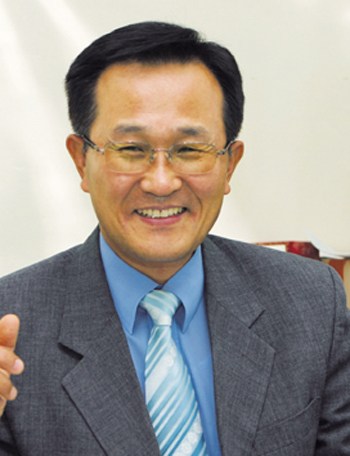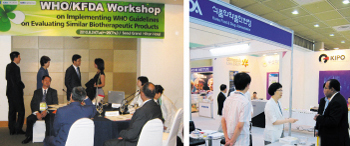¡®Prospects of Biopharmaceutical Industry Bright¡¯
KFDA strives to build institutional infrastructure and provide support to nurture the Korean biopharmaceuticals and biosimilar industry
 "Now that Korea has accumulated experience in the development of biosimilars and gifted manpower, the Korean biosimilar industry, albeit at an initial stage, is considered to have the potential to develop biosimilars with an international competitive edge,¡±said Lee Jeong-Seok, director general of the Biopharmaceuticals and Herbal Medicine Bureau of the Korea Food and Drug Administration (KFDA).
"Now that Korea has accumulated experience in the development of biosimilars and gifted manpower, the Korean biosimilar industry, albeit at an initial stage, is considered to have the potential to develop biosimilars with an international competitive edge,¡±said Lee Jeong-Seok, director general of the Biopharmaceuticals and Herbal Medicine Bureau of the Korea Food and Drug Administration (KFDA).
Lee said Korea has already obtained enough capabilities to make inroads into foreign markets with six biomedicine products among the nation¡¯s top 10 finished pharmaceutical exports. The KFDA is establishing regimes for managing the safety of biopharmaceuticals in accordance with global standards while disclosing the information on the approval and evaluation of biopharmaceuticals and suggesting guidelines for studies meeting international standards as part of its efforts to build an institutional infrastructure for the development of the Korean biopharmaceuticals and biosimilar industry, he said.
The following are excerpts of an interview between NewsWorld and the KFDA director general, who touched on government policies including strategies to nurture the Korean biopharmaceuticals and biosimilar industry.
Question: Will you tell us about the current status of the Korean biopharmaceutical industry and its prospects?
Answer: The value of the Korean pharmaceuticals market is estimated at 18.2 trillion won ($14.3 billion), and out of the total, biomedicine products take up a 15 percent share, or account for 2.8 trillion won. Here is a look at the official approved biomedicine products in Korea. About 20 pharmaceutical firms have obtained permission for producing some 200 vaccine products, while 40-odd firms have been approved for manufacturing some 300 genetic recombinant drugs. I bet that Korea has already obtained enough capability to make inroads into foreign markets, as six biomedicine products were among the nation¡¯s top 10 finished pharmaceutical exports.
In the case of developing biosimilars, LG Life Sciences obtained approval for the human growth hormone biosimilar Valtropin from Europe in 2007. Currently, three biosimilars are under approved clinical trials, and about 10 pharmaceutical firms are developing and plan to develop some 20 biosimilars. Now that Korea has accumulated experience in the development of biosimilars and gifted manpower, the Korean biosimilar industry, still albeit at an initial stage, is considered to have the potential to develop biosimilars with an international competitive edge.
Q: What about the current status of the global biomedicine and biosimilar industry and its prospects?
A: The value of the global pharmaceuticals industry was estimated at 1,068 trillion won ($837 billion) in 2009, and biomedicine products accounted for a 15 percent share of the total, or $125 billion. The industry is forecast to be worth $1.3 trillion in 2020. As the global biopharmaceuticals industry has built a strong pipeline with high R&D outlays, the industrial field is predicted to maintain an annual average growth rate of more than 10 percent and occupy more than half of each market in a short period of time. Biopharmaceuticals are expected to take the stage in the development of new pharmaceuticals, serving as an engine in the global pharmaceuticals industry.
The value of the global biosimilar market is estimated at $5 billion in 2008, and the figure is forecast to surge to $26 billion in 2015. As biosimilars can be approved following patent and exclusivity expiry of the innovator biopharmaceuticals, countries are scrambling to make strategic investments in the biosimilar field.
The biosimilar market is likely to expand, as the United States, the world¡¯s largest biopharmaceuticals market, approved a health care reform bill this past March.
Q: Will you elaborate on the government¡¯s strategies to provide support for nourishing blockbuster biopharmaceuticals and biosimilars?
A: Recognizing the need for establishing an institutional pathway for commercializing biosimilars with a completive edge, the KFDA worked out regulations on screening the approval of biosimilars and evaluation guidelines in July 2009. We have also set regulations on stage-by-stage development evaluations before officially applying for the approval of biopharmaceuticals and biosimilars in order to ensure the efficient management of a pre-submission consultation system, now still in the process of legalization in the interest of applicants. This is designed to help pharmaceutical firms wanting to get advice on the development of biopharmaceuticals and the approval stage or those who wish to expand production facilities. Case-by-case consultation channels will be formed among officials from relevant pharmaceutical firms and the KFDA to minimize firms¡¯ trials and errors.
Q: What steps are in place to build an institutional infrastructure or provide support to the Korean biopharmaceuticals and biosimilar industry¡¯s entry into foreign markets?
A: The nation¡¯s pharmaceutical systems and management regimes need to be made in keeping with global standards so as to help Korean-made biopharmaceuticals get a global competitive edge. To achieve this goal is the KFDA¡¯s task.
The KFDA is building regimes for managing the safety of biopharmaceuticals in accordance with global standards while disclosing the information on the approval and evaluation of biopharmaceuticals and suggesting guidelines on studies meeting international standards in order for pharmaceutical firms to make the most of them. We operated an advanced pharmaceuticals approval system by introducing the Common Technical Document (CTD), a set of specifications for an application dossier of the registered medicines, which is in global use.
The KFDA plans to play a leading role in carrying out technical consulting and manpower development, essential for such institutions as the tentatively named New Drug Development Support Center, while aggressively participating in the construction of the so-called High-tech Medical Complex and other bio-clusters in the wake of the soon-to-be relocated KFDA headquarters in Osong, Chungcheongbuk-do.
Q: Will you explain the KFDA¡¯s key tasks for developing the local biopharmaceuticals industry?
A: First, we strive to ensure that the nation¡¯s assessment systems for the approval of biopharmaceuticals should conform to global standards and establish institutional regimes. Second, the KFDA encourages the private sector to expand R&D investments in the field. Third and lastly, we devote ourselves to nurturing regulatory affairs professionals while striving to strengthen the nation¡¯s presence abroad.
Q: Will you explain Bio Korea 2010, the nation¡¯s biggest international bio convention, which took place at COEX in Seoul from Aug. 31-Sept. 3 with many policymakers, industry people and experts from Korea and abroad?
A: The KFDA received requests for consultations on the approval of biopharmaceuticals, particularly from many venture companies engaged in R&D activities and foreign participants. The event served as an opportunity to demonstrate to foreigners our capability to produce biopharmaceuticals.
The KFDA will invite officials from the National Regulatory Authority in the Middle East early November, in cooperation with the Jordanian Food and Drug Administration (JFDA), serving as an opportunity for them to get a glimpse into the Korean policies on pharmaceutical systems. The program, initiated by Celltrion, will be an opportunity to explain Korean policies on pharmaceuticals.
The KFDA and the World Health Organization (WHO) jointly held a workshop on implementing WHO guidelines on evaluating similar biotherapeutic products at the Grand Hilton Hotel in Seoul from Aug. 24-26. The forum was designed to exchange information on the latest trends on similar biotherapeutic products and establish a network among exporters.
Thirteen foreign experts from such regulatory agencies as the WHO, the UK¡¯s National Institute for Biological Standards and Control (NIBSC) and Health Canada, as well as 10 Korean KFDA officials participated in the forum. Among those on hand were Elwyn Griffiths, associate director general of Health Canada; Teruyo Njue, review director of the Japanese Pharmaceuticals and Medical Devices Agency (PMDA); N. Hadayaand, an official of the Iranian Ministry of Health; Rania D. Haddadin, clinical pharmacist of the Jordanian Food and Drug Administration; and Kang Hye-na, a WHO scientist. nw
Lee Jeong-Seok, director general of the Biopharmaceuticals and Herbal Medicine Bureau of the Korea Food and Drug Administration
(photos from right) The Korea Food and Drug Administration¡¯s booth at Bio Korea at COEX in Seoul on Sept. 1-3. The World Health Organization and the KFDA jointly organized a workshop on Implementing WHO guidelines on evaluating similar biotherapeutic products in Seoul Grand Hilton in August.
3Fl, 292-47, Shindang 6-dong, Chung-gu, Seoul, Korea 100-456
Tel : 82-2-2235-6114 / Fax : 82-2-2235-0799